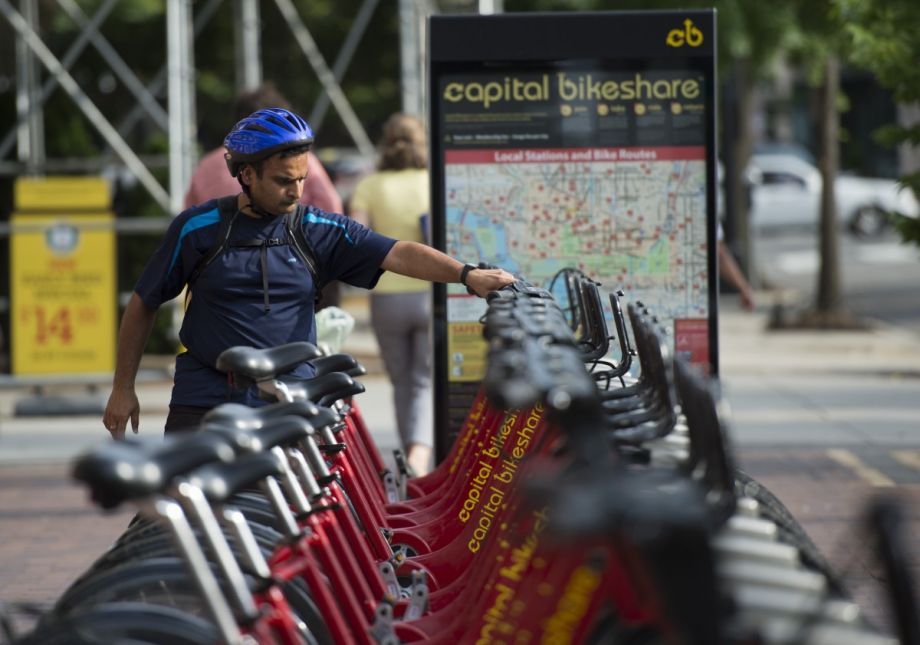Ursula Sandstrom loves her job. The 24-year-old works as a bike checker for Capital Bikeshare (CaBi) in Washington, D.C. She is part of the team that makes sure each of the 2,500 bikes in the 300-station system gets a once over each month. When a bike needs air or chain lube or a quick tweak of the brakes, Sandstrom grabs the tools from the 30-pound trailer she pulls behind her bike to each station check. When a bike needs a major overhaul, she sends it to the warehouse shop for mechanics to fix. The bike checker department is “horizontal” and makes collective decisions to the extent the job allows, another element of work life that keeps Sandstrom happy.
“I’m energized by my co-workers. We have this really great team, and it’s really cool to be building this thing together. Bike-share is [having a] transformative impact on the city,” says Sandstrom.
She does not like that she and her colleagues could be fired at any time or that directives from their bosses could come down to change the way her department operates. So when her colleagues started talking about the possibility of joining a union, Sandstrom signed on to help make it happen.
“We’re not fueled by negative horror stories, but rather the desire to have a voice at the table and unite as a collective,” Sandstrom says. “This is about protecting us in the future, making sure we can keep doing the job we really like doing.”

Ursula Sandstrom
CaBi is owned by District Department of Transportation and its counterparts in suburban Maryland and Virginia. Those agencies contract with Alta, which started in Portland and is now headquartered in New York, to manage the system day-to-day. Alta has similar contracts in NYC, Boston and seven other cities in North America and Australia. With New York investment company REQX’s recent acquisition of Alta (the reason for the HQ move), CaBi employees are all the more worried about their job security.
CaBi’s road to unionization has been swift. Four Alta employees met with a TWU representative in late September. They submitted union cards from 92 percent of employees to the National Labor Relations Board in October. They resubmitted cards in November after the first round was dismissed. Now, the NLRB will hold a union election at the CaBi offices in D.C.
“Our company supports the right of its employees to decide whether they want to join or not join the union,” an Alta spokesperson who asked not to be identified told me. But that neutral stance belies their effort to discourage unionization.
After REQX bought Alta in October, the company hired lawyers from Jackson-Lewis, a firm known for its strong anti-labor stance. They got those first union cards thrown out, citing inclusion of a supervisor’s card in the collection. CaBi’s General Manager Eric Gilliland has issued memos warning against TWU’s outside interference.
On November 21st, he wrote, “A union which has no experience in bike sharing and is based in New York should not get in between us and interfere with how we work together in DC.”
On November 24th, they also fired Fhar Miess, a 41-year-old CaBi bike checker who was leading the organizing effort. Alta says Miess was fired after attending a union conference in New York because he was a supervisor and it is illegal for bosses to participate in unionizing efforts. (It was Miess’ union card that got the original NLRB petition tossed out.) Miess contends that because of his department’s collective decision-making process he was only a supervisor in title and that he was no longer helping unionize.
“I wasn’t actually engaged anymore in organizing on the shop floor in D.C. I was just attending a convention that I had already previously planned to attend before management informed me that I was barred from doing any kind of organizing,” Miess says.
In a statement about the firing, Alta said: “There is no question that the employee who was terminated was a supervisor and member of management. He managed a team of 10 employees, was responsible for hiring, scheduling, disciplining and performance reviews, and served as the point person for his department at senior staff and safety committee meetings.”
Miess has been with CaBi since July 2011 and his departure has been a bit of a blow for his colleagues. “Things have been really wonky as we try to figure out what [Miess’ firing] means both from a union perspective and our day-to-day work,” Sandstrom says.
For Sandstrom and most of her colleagues, this campaign is their first experience with union organizing. Miess hadn’t organized directly prior to this, but he is a former Industrial Workers of the World member and has lots of experience in worker co-operatives. He was one of the four employees who first met with the TWU rep this fall to get started on organizing. He was also involved in earlier disputes between employees and management over underpayment and working conditions.
A year ago, Miess and his colleagues protested that as federal contractors their wages and benefits weren’t meeting the legal minimum. It prompted a Department of Labor investigation and back pay has since been distributed. He also says there were issues with their old warehouse in D.C.’s industrial Buzzard Point neighborhood: “Lots of airborne contaminants and pollutants from the diesel power plant across the street, cement processing plant next door to the recycling facility a couple blocks away that occasionally burned things.” Things improved dramatically when they moved to a new warehouse in a different part of the neighborhood.
Despite those issues, Miess says for him, unionizing CaBi is more about making sure workers’ rights are a key part of the green economy.
“There’s a lot of attention to a certain kind of sustainability that applies to natural ecosystems, but we’re largely not paying attention to human ecosystems and the fact that people need to live, take care of their families, and be well-compensated for the work that they’re doing,” says Miess.
Miess says most of his colleagues at CaBi currently can’t afford to live in neighborhoods with bike stations. “The company needs to make significant efforts to compensate its workforce in a way that allows the people creating this new urban environment to actually live in it,” he says.
He also worries that Alta’s new owners will exacerbate the image of bike-share as exclusionary.
“There’s already a pretty big suspicion among a lot of older residents of Washington, D.C. about CaBi … that they’re trying to remake the city so it is more comfortable for people who are wealthier, younger, whiter than they are,” Miess says. “The fact that CaBi is being bought out by people whose obvious niche is those people … is likely going to make it more difficult to make bike-share more accessible to everyone.”
Sandstrom says she’ll be shocked if they don’t get the simple majority they need to join TWU in the NLRB vote. “To not have unionization happen now we would need to suddenly lose 37 percent of the supporters we’ve got.”
Post-unionization, CaBi’s workers would have lots to do actually negotiating the terms of their contracts. Most of their demands are still TBD.
“The main thing is preventing random firings,” says Sandstrom, “stability in our jobs, making sure that the system we have right now can keep going. We’ve put our heart and soul into operations for the last four years. We need to make sure we don’t lose that.”
UPDATE: On December 17th, Capital Bikeshare workers voted 41 to 14 in favor of joining Transport Workers United Local 100.

Josh Cohen is Crosscut’s city reporter covering Seattle government, politics and the issues that shape life in the city.
Follow Josh .(JavaScript must be enabled to view this email address)


_600_350_80_s_c1.jpg)













